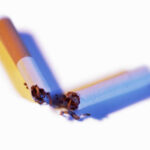Republishing results with acupuncture on nicotine withdrawal symptoms
 Researchers from the Korea Institute of Oriental Medicine, in Daejeon, compared nicotine withdrawal symptoms (depression and anxiety) after acupuncture and sham acupuncture.
Researchers from the Korea Institute of Oriental Medicine, in Daejeon, compared nicotine withdrawal symptoms (depression and anxiety) after acupuncture and sham acupuncture.
First, the details.
- 80 smoking volunteers were randomly assigned to receive 6 sessions of real or sham acupuncture for 2 weeks.
- They were re-evaluated 2 weeks later.
- The participants in this study were 18 to 65 years old, and smoked at least 10 cigarettes/day for longer than 6 months.
- Changes in the Minnesota Nicotine Withdrawal Score, the Beck Depression Inventory, and Beck Anxiety Inventory were recorded.
And, the results.
- Nicotine withdrawal symptoms didn’t differ significantly between the real and sham acupuncture groups immediately after the treatment and at the 2-week follow-up.
- However, compared to the start of the study there was a 65% and 62% improvement in the Minnesota Nicotine Withdrawal Score in the real and sham acupuncture groups, respectively, at the end of the study, which persisted at the 2-week follow-up.
- Both groups also showed similar improvements in Beck Depression and Anxiety scores.
The bottom line?
Real acupuncture treatment tested in this trial,” concluded the authors, “was no more effective than sham acupuncture at reducing nicotine withdrawal symptoms, depression and anxiety for smoking cessation.”
I’m not so sure that no difference from sham is a negative result, considering that the act of administering acupuncture (“real” or “sham”) was associated with significant improvement.
This study is virtually identical to one published in 2008. Only the name of the researchers’ institution has changed. It’s even published in the same journal, eCAM.
Only my conclusion has changed in the past 2 years.
5/4/10 19:14 JR